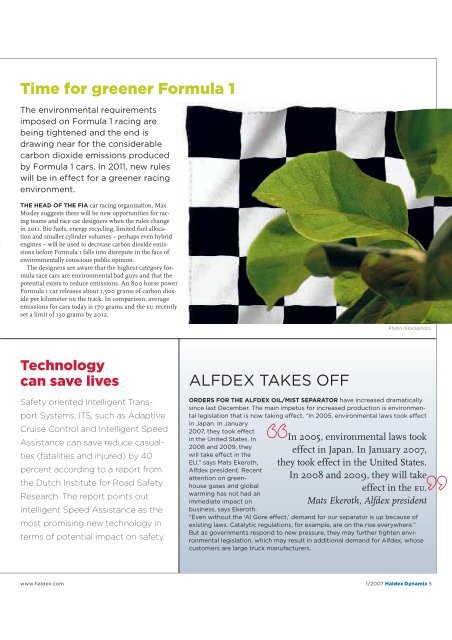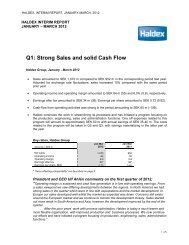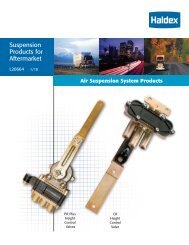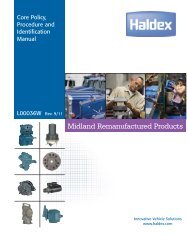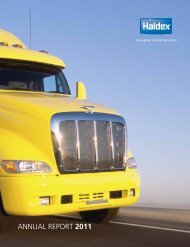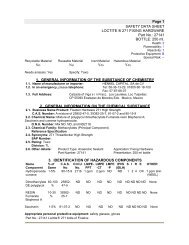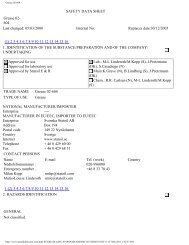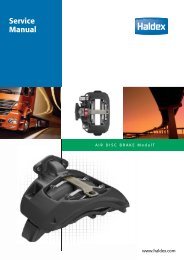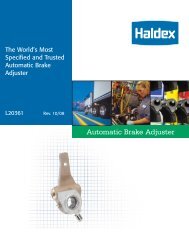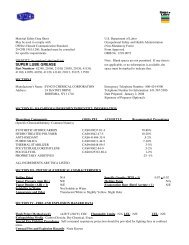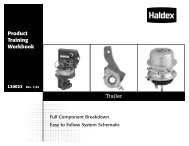Intelligence for All Wheel Drive - Haldex
Intelligence for All Wheel Drive - Haldex
Intelligence for All Wheel Drive - Haldex
You also want an ePaper? Increase the reach of your titles
YUMPU automatically turns print PDFs into web optimized ePapers that Google loves.
Time <strong>for</strong> greener Formula 1<br />
The environmental requirements<br />
imposed on Formula 1 racing are<br />
being tightened and the end is<br />
drawing near <strong>for</strong> the considerable<br />
carbon dioxide emissions produced<br />
by Formula 1 cars. In 2011, new rules<br />
will be in effect <strong>for</strong> a greener racing<br />
environment.<br />
THE HEAD OF THE FIA car racing organization, Max<br />
Mosley suggests there will be new opportunities <strong>for</strong> racing<br />
teams and race car designers when the rules change<br />
in 2011. Bio fuels, energy recycling, limited fuel allocation<br />
and smaller cylinder volumes – perhaps even hybrid<br />
engines – will be used to decrease carbon dioxide emissions<br />
be<strong>for</strong>e Formula 1 falls into disrepute in the face of<br />
environmentally conscious public opinion.<br />
The designers are aware that the highest category <strong>for</strong>mula<br />
race cars are environmental bad guys and that the<br />
potential exists to reduce emissions. An 800 horse power<br />
Formula 1 car releases about 1,500 grams of carbon dioxide<br />
per kilometer on the track. In comparison, average<br />
emissions <strong>for</strong> cars today is 170 grams and the eu recently<br />
set a limit of 130 grams by 2012.<br />
Technology<br />
can save lives<br />
Safety oriented Intelligent Transport<br />
Systems, ITS, such as Adaptive<br />
Cruise Control and Intelligent Speed<br />
Assistance can save reduce casualties<br />
(fatalities and injured) by 40<br />
percent according to a report from<br />
the Dutch Institute <strong>for</strong> Road Safety<br />
Research. The report points out<br />
Intelligent Speed Assistance as the<br />
most promising new technology in<br />
terms of potential impact on safety.<br />
ALFDEX TAKES OFF<br />
ORDERS FOR THE ALFDEX OIL/MIST SEPARATOR have increased dramatically<br />
since last December. The main impetus <strong>for</strong> increased production is environmental<br />
legislation that is now taking effect. “In 2005, environmental laws took effect<br />
in Japan. In January<br />
2007, they took effect<br />
in the United States. In<br />
2008 and 2009, they<br />
will take effect in the<br />
EU,” says Mats Ekeroth,<br />
Alfdex president. Recent<br />
Photo iStockphoto<br />
‘‘<br />
In 2005, environmental laws took<br />
effect in Japan. In January 2007,<br />
they took effect in the United States.<br />
In 2008 and 2009, they will take<br />
effect in the eu.<br />
Mats Ekeroth, Alfdex president’’<br />
attention on greenhouse<br />
gases and global<br />
warming has not had an<br />
immediate impact on<br />
business, says Ekeroth.<br />
“Even without the ‘Al Gore effect,’ demand <strong>for</strong> our separator is up because of<br />
existing laws. Catalytic regulations, <strong>for</strong> example, are on the rise everywhere.”<br />
But as governments respond to new pressure, they may further tighten environmental<br />
legislation, which may result in additional demand <strong>for</strong> Alfdex, whose<br />
customers are large truck manufacturers.<br />
www.haldex.com 1/2007 <strong>Haldex</strong> Dynamix 5


